Can Goats Eat Tomatoes And Celery?
Karla MillerIt is not difficult to feed the goat. In summer there are no problems with feeds. If there is a pasture, the question of feeding, in general, disappears. Abandoned forest, an abandoned field, an abandoned flowerbed or lawn – nothing special goat is required. Sedge, acacia, and any grass go to the goat for food. In nature, goats roam the mountain slopes very poor (in terms of food). In the stabling of goats, the issue of nutrition is more complex but quite solvable. How and what to feed and feed goats in winter and summer, we will tell in this article.
Where to feed goats in the summer?
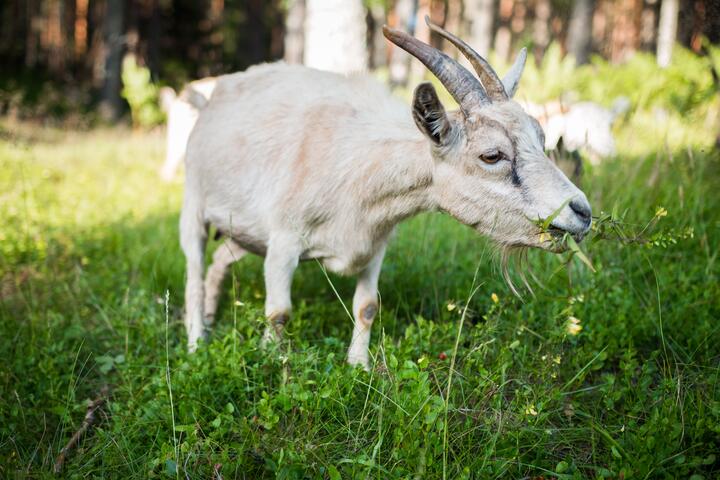 Photo by Maria Tyutina on pexels.
Photo by Maria Tyutina on pexels.If you have a choice of pasture, it is better to graze goats where they grow:
•Clover;
•Lucerne;
•Sweet clover,
•Elytrigia;
If the pasture is sown, it is good for goats to sow it with the following crops:
•Cat grass;
•Bromes,
•Alopecurus pratensis,
•Ryegrass,
•American Elytrigia,
•White Clover
If the soil allows, you can diversify the crops: suitable legumes, fodder cabbage, cereal grasses. The best for goats hay from sowing – from legumes. When feeding hay legumes, the amount of grain in the feed should be reduced.
The goat has a wonderful digestive system – 4 chamber stomach. It allows you to digest goat and branches, sedge, needles, and algae.
Without rough feed, the goat can not. On a day it needs at least 1 kg, and ideally 3-5 kg, branches can replace up to 30% of the rough feed.
Feeds are divided into three main species. Rough, juicy, and concentrated.
Coarse feed for goats
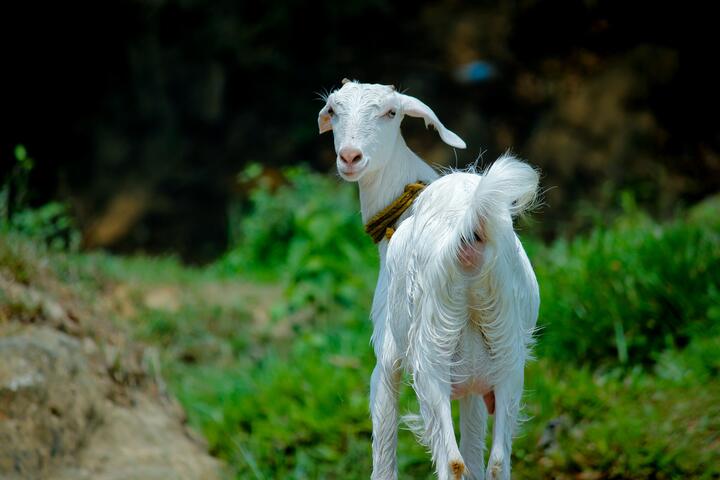 Phpto by Nandhu Kumar on pexels
Phpto by Nandhu Kumar on pexelsRough food is the most natural for goats. After the end of vegetation of plants, goats have to content themselves with hay, twigs, straw.
Hay is stored at the beginning of flowering plants. Then it contains a maximum of its vitamin and microelement composition. Raw from dew and rain grass is dried. The most valuable is considered hay from field meadows.
You can not stock hay on city lawns and roadsides. Hay from the swamp, forests, and lowlands is no better than straw. And straw grain crops can not be replaced by hay. You can give it a maximum of a quarter or a third of the hay. And this is about spring crops straw. The straw from winter crops is even less nutritious.
In winter you can feed goats with cereals – wheat, barley, rice, oats, corn. Grind grain and add to the hay. You can mix different grains, but not more than 0.5 kg per day per head.
Barley is better suited for fattening meat breeds. Dairy goats from barley gain extra weight. As a result, the milkiness of goats is worsened, and the breeding qualities of goats are reduced. The oat is suitable only for mature goats. If it is prickly, it is poorly digested and absorbed.
Grain must not be abused. No more than 300-500 g per day for one goat. The grain is given in a dry form so that goats chew it for a long time. Goat porridge can not be digested, porridge – for animals with a single stomach.
In order not to damage the teeth of animals, cereals should be grinded.
Rough forage is also tree branches. They are given in half with hay, it is better not to give them separately, they are low nutritious. It is best to take the branches to prepare them:
•birch,
•willow,
•willow,
•linden,
•alder,
•hazelnut.
Their goats eat willingly. It is good to make branches to replace hay in winter.
Juicy feed for goats
In summer, succulent food for goats – grass. In winter it is replaced by pumpkin, cabbage, carrot, beet. Juicy fodder is distinguished by its milkiness.
Root vegetables are given in raw but washed and cut. And the food goes all the root vegetables with the botanicals and roots. Raw give all the root vegetables, except potatoes. It must be boiled. And give no more than 500 g per day.
In summer, goats are given a scavenger of apples and pears. Goat apples are very fond of goats but do not give them much. They are sour. Give goats overripe cucumbers and zucchinis, as well as tomatoes, celery, and peppers. The vegetables are crushed so that the goats do not choke. Dirty vegetables need to be washed, and rotten vegetables need to be cut.
When feeding the vegetables and the heap, add chalk to them. As they are sour in themselves.
What to drink goats with?
Goats often suffer from dehydration. At the same time, they refuse to drink water. This is because in nature goats drink the purest mountain water. And their water requirements are high.
This problem can be solved easily. Make tea for them by brewing herbs.
You should start training with water for goats. They brew compotes. Orange peel, potato peel, apple peel – nothing special. Just a fragrant drink. Goats like water with smoke. Preferably heated at the stake with birch logs. Yes, although goats are unpretentious, they can be quite capricious.
The tea temperature in winter should be not less than 45ºС. Goats will not drink cold tea. One goat needs up to 6 liters of water per day.
Can Goats Eat Tomatoes?
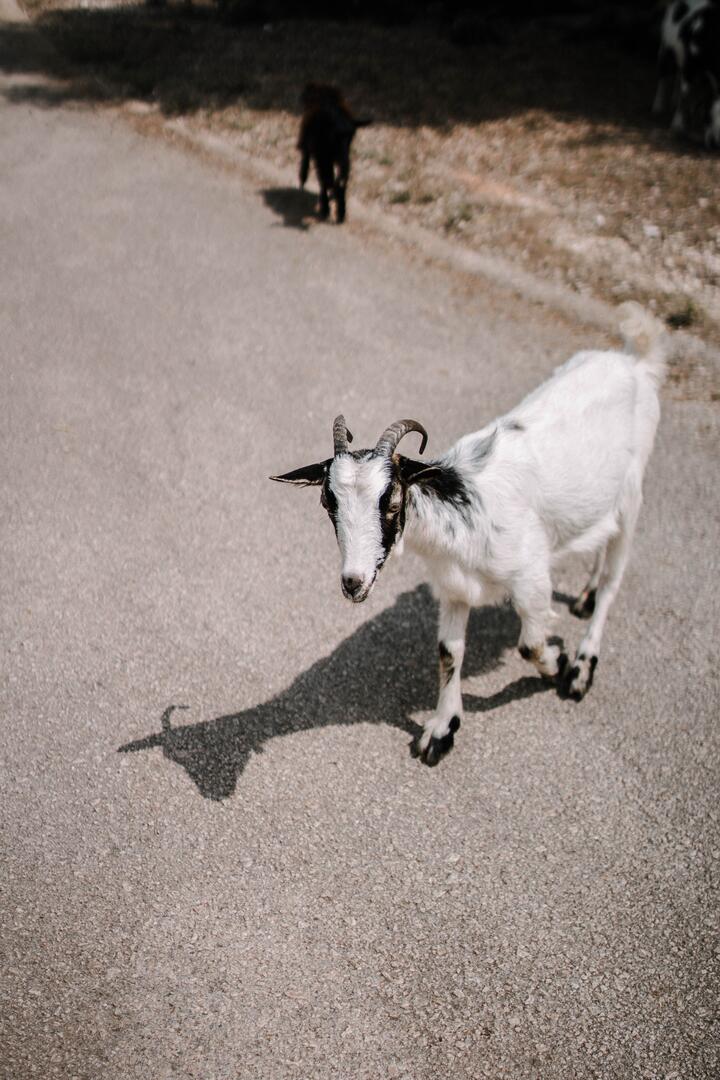 Photo by Djordje Petrovic on pexels
Photo by Djordje Petrovic on pexelsCan goats eat tomatoes? Yes, but only in small amounts. While the fruit of the tomato is nutritious, the green part can be toxic to goats. The alkaloids found in tomatoes can cause gastrointestinal distress and may damage the health of your goat. If you want your goat to eat your tomato plants, you should monitor their health. However, you cannot fully prevent them from eating them. You can try to protect your garden from their predilection by providing plenty of green vegetables.
Tomatoes are a common food for goats. They are not toxic to goats, but they are not suitable for young goats. A tomato plant can be dangerous for your goat. The tomato stem, leaves, and vines should never be fed to goats. While the tomato plant is safe to eat for older goats, it should be limited to small amounts. A few pieces of fruit each day will help strengthen their digestive systems and prepare for the transition to a new diet once they are weaned.
It is not recommended for young goats to eat tomatoes. A young goat is not yet able to digest the fruit. During this time, they must be fed milk. The tomato fruit is not appropriate for a young goat. It will aggravate their digestive system and result in diarrhea and stomach upset. If you do choose to give your goat tomatoes, be sure to monitor their consumption. If the amount is too high, they could end up suffering from vomiting and diarrhea.
In addition to the fruits, tomatoes also contain a lot of vitamins and minerals that your goat will need for proper growth and development. The tomato is loaded with vitamin K, which helps the body form blood clots. In addition, the vitamin contains fiber that keeps the digestive system clean and allows bowels to function properly. This vitamin is essential for the formation of DNA and RNA. Tomatoes also help prevent kidney stones and bone cancer.
Tomatoes contain high levels of alkaloids and are therefore toxic for goats. The leaves and stems of the tomato are prickly, which makes them unappealing for goats. Consequently, goats cannot eat the tomato in one sitting. As a rule, tomatoes should be fed only as a treat or in small portions. Even if they are toxic, they shouldn’t be fed in large quantities.
While goats can eat tomatoes, they should only be given in small amounts. To avoid harmful consequences, make sure your goats have a balanced diet. Do not allow them to go hungry. They may not eat their dinner, and they will end up with diarrhea. If you are feeding your goats tomatoes twice a day, your goats should be eating them at least once a week. If they are not getting enough food, they might suffer from malnutrition.
If you have a tomato garden, your goats will eat it. However, the number of tomatoes they eat can vary greatly. It is best to keep tomatoes out of your goat’s reach. Tomato plants contain high amounts of alkaloids and can be poisonous to goats. If your goat eats too many tomatoes, it can cause gastrointestinal problems. If you have a large garden, you can plant many different types of plants and vegetables in a garden for your goat.
Goats can eat tomatoes. However, they shouldn’t ingest tomato leaves. It is not recommended to feed tomatoes to a goat when they are young. You should use the fresh tomato leaves as a source of nutrition and minimize the risk of the animal developing. You can also give your goats fresh tomatoes, but don’t overfeed them. If you feed them only a small amount, they won’t like it.
Tomatoes can be dangerous to goats if they eat the leaves of a plant. If they do, they may develop toxic symptoms, including high body temperatures, confusion, and trouble with sight. While the fruit of a tomato is not toxic for a goat, the leaves should be kept away from your goat. If you do let your goat eat tomatoes, keep in mind that they’ll only eat the ripe ones.
- WildlifeMaximum Antelope Speed

- Birds50 Interesting And Surprising Facts About RavensBy Charlotte Green

- WildlifeCan A Lizard Swim?By Evelyn Star

- LivestockCan Goats Eat Tomatoes And Celery?By Karla Miller
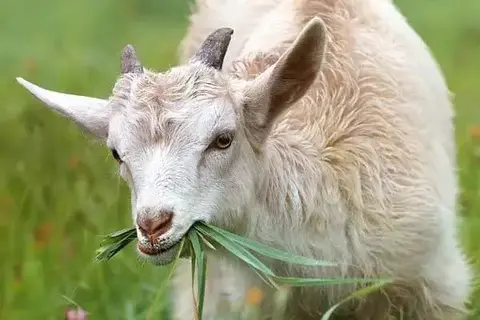
- LivestockThe Prodigal Sheep Returned To The Home Farm Seven Years LaterBy Amelia B

- InsectsWhat Is Ladybug Food?By Noah Young
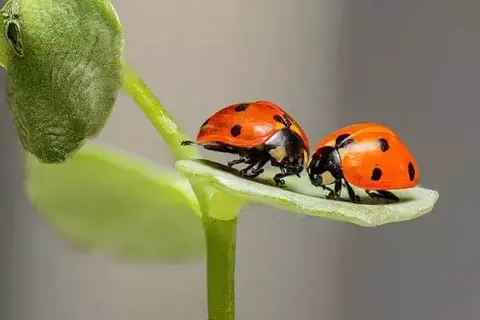
- WildlifeTop 10 Most Dangerous Animals In The WorldBy Amelia B

- WildlifeFacts About Dolphin BabiesBy Evelyn Star

- WildlifeAmazing Facts About A StarfishBy Nolan Foster

- WildlifeSnow Leopard Habitat And ConservationBy Khai Dove
